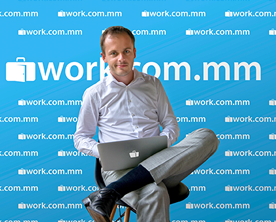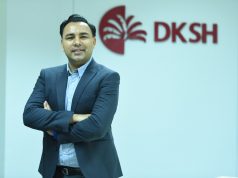Career Background
I have worked for Randstad in the Netherlands, this is the second largest recruitment company in the world. I was in a team that was developing a new product there. I studied Finance and Law from the University of Amsterdam.
[paypal]
When was your first visit to Myanmar?
My first visit was in January 2016.
What was your impression of the country then?
I really liked it. One of my first thoughts was that Myanmar was (and is) one of the most welcoming countries I had ever been before. Extremely friendly people, beautiful landscapes, a very interesting and vibrant culture and an environment full of opportunities. I especially loved the food culture. There are many regional dishes that I still enjoy today, Shan noodles and sweets from Mandalay are currently my favourites.
How did you end up as your current position?
Before joining the team here in Myanmar, I was leading work.com in Bangladesh. After a successful kick-start of operations in that country, I was offered the opportunity to move to Myanmar, a more mature market for the company, and take over the managing director position at work.com.mm. I accepted it and I have no regrets. It has been a very fulfilling experience personally and professionally so far.
Can you describe your primary responsibilities?
At work.com.mm, we have a great team that works hard on making sure that ensures the quality of the CVs and to make sure to keep job seekers and companies satisfied. Managing the team and growing the business are my main responsibilities.
Since when work.com.mm has been operating in Myanmar?
Work.com.mm started operations in Myanmar in June 2012, so we are about to celebrate our 4th year anniversary in the country. Back then, we were one of the first ones who believed in Myanmar and started a job website here. In the beginning, not a lot of people had internet access, but this has changed fast in the last 12 months – more people are currently connected to the internet and our traffic has increased exponentially.
What are the current projects that your team has been working?
We have just closed several partnerships and started new project, which I am very excited about. We just closed a partnership with Viber. You can now connect with us via the app, follow what our new project and events are and get the latest job opportunities. I never used Viber until one month ago, and am now a big fan of the platform. We are also currently partnering up with a research firm whom will help us make an extensive labour market report available in July. We are currently collecting data about job seekers and companies and will soon present the results. The labor market in Myanmar raises a lot of questions, as it has some unique features. Due to the dynamism of the job market in the country, people in Myanmar tend to not stay at a job for a long time and companies tend to lose a lot of talented people in a short period. In the report, we explain contributing factors and we give insights about salary in different sectors. Lastly, I would like to mention our new office in Mandalay. Since 3 months ago, we have colleagues on the ground there and we are organizing large events to help top employers in the region finding the right employees. Last month we had a large job fair in the Yatanar Mall and, on the 28th of May, we will do an event with Ooredoo in the Sedona Hotel in Mandalay. More and more people are finding us there and more and more companies are posting jobs for people in Mandalay.
Please tell us more about work.com. mm.
Work.com.mm is an online career portal that connects the best talent with top companies in Myanmar. Our website has the largest CV database of the country and we work with a lot of top brands. What we pride ourselves on is our user-friendliness and our delicate customer service. Our product has intuitive features and helpful tools such as CV creation, instant assistance from our team of HR professionals and overall great support that helps simplifying the job search and hiring process for both, job seekers and employers in Myanmar.
What are the long term objectives of work.com.mm?
Our long term goal is to maintain our position as the leading online career portal in Myanmar. We can only do this if we continue to build good relationships with our customers and we listen and adapt to their needs. Good customer service and a high quality CVs will be our continuous focus.
What is the estimated number of people who got job through the website per month?
We see that the number of people are applying are increasing a lot, in May more than 35,000 job seekers applied for jobs. We find that consistently over time companies find us the most cost-effective and most helpful when searching for new talent for their companies.
What are the benefit of searching job through website compare with in person?
The big advantage is that it is much easier to connect via our website then via a newspaper or recruitment agency and that it saves a lot of costs. Before our website you had to visit a recruitment firm or you had to check out a newspaper. Applying for jobs was a lengthier process and the number of jobs was more limited. Our platform made the process easier and gave access to a larger number of jobs.
What is your opinion on Myanmar’s human resource sector?
The human resources sector is a complex one which includes a large number of players – HR Managers, job portals, test and training centres – and a wide number of practices and responsibilities – from recruitment itself to employer branding and training. I think companies can still improve in terms of employer branding. Employees really appreciate it if you give additional perks and take to time listen to their needs. We for example want to offer English classes to our people.
In which working in Myanmar different from other countries?
We work in 10 different countries, in Asia we are active in Sri Lanka, Bangladesh and Cambodia besides Myanmar. In all three countries we are much newer and we have been in these countries for just over a year. Each country is focusing on the local market, but of course we share best practices.
From a business standpoint, what do you feel are the biggest challenges facing you and your team in Myanmar in next 1-3 years?
We are in a competitive market, so that keeps it challenging but at the same time dynamic. It shows the potential of the market and it pushes product improvements and it boosts creativity. I think another big challenge is payment options. At this point there is not a much-used mobile payment system and bank transfers are still a lengthy and bureaucratic process. If there is a good mobile payment system and a cultural shift to use mobile payment methods, then companies from outer regions would be able to use our services. Finally, something to always keep in mind is to to keep working on maintaining our company culture and keep having a great team. We will continue investing in our people and developing them as much as possible.
What effect do you think that the sudden influx of foreign companies/nationals will have?
I see advantages and disadvantages. A big advantage is that more products are being offered that have never been sold here. Also, the influx of foreign companies increased competition and products became cheaper, a good example is the huge decrease in price of a simcard over the last 5 years. Another advantage is that it has boosted economic growth in this countries and that salary and purchasing power of Myanmar people increased a lot over the past few years. A challenge in the coming time is to make more people benefit from the growth here in Myanmar, so that there is inclusive economic growth.
What advice would you give to someone looking to start up a business and invest in Myanmar?
I think this is a great time to invest in Myanmar. The current growth is something that Myanmar has not known for a long time and I believe this growth will continue to be high in the coming years. Compared to neighbouring countries, Myanmar continues to dominate the charts in terms of economic growth. That said, starting a business is relatively expensive in Myanmar, partially due to government regulation, so you need to have a good plan in which investors believe in and focus.
If you could make one major change to any government policy, what would it be?
I would try to drive financial innovation and make regulation such that investing and starting a business is made easier. Also, I would invest more in the healthcare system in Myanmar so that all people have a chance of getting helped well when they are most vulnerable.
How are you enjoying your days in Myanmar?
I am very happy that the raining season just began and a period of high temperatures has ended. Also, every day new places open up and I am keen to check them all out in the coming time.[/paypal]










